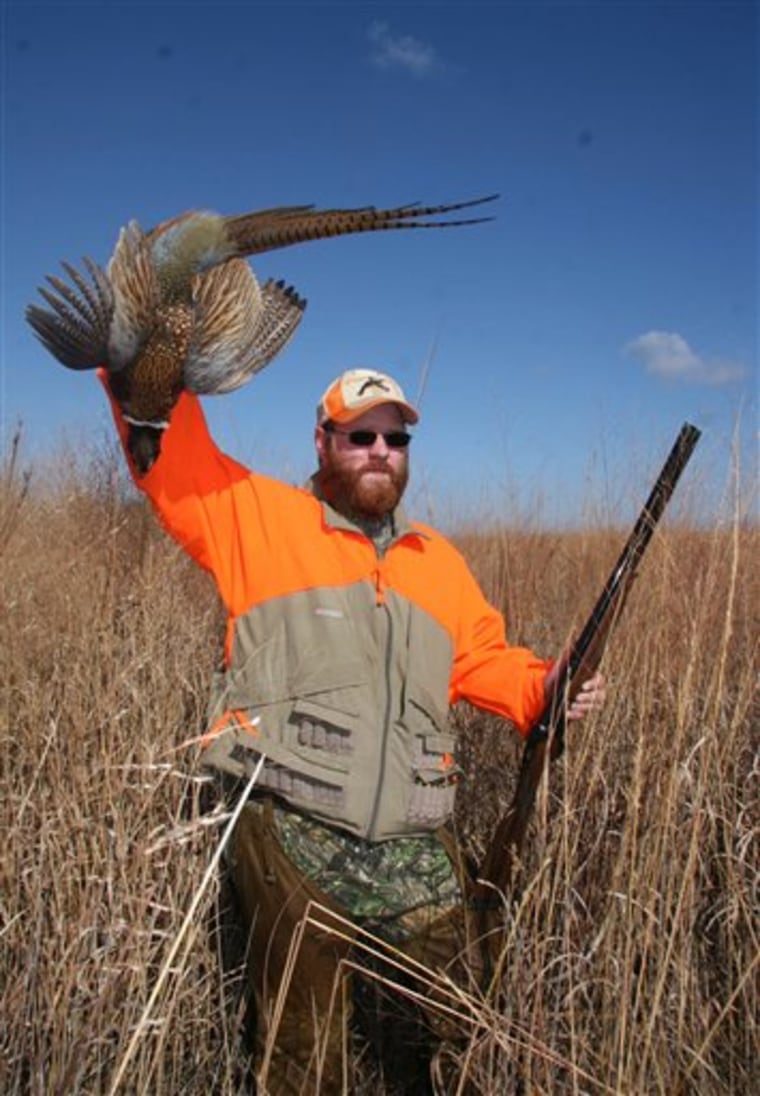Hunters in more than a dozen states can rest easy — their right to track deer or shoot pheasant has now been protected in their state constitutions.
Those rights will extend to hunters in Kentucky and Wyoming if voters there agree next year, and more states may soon follow.
The idea of enshrining hunting and fishing rights in state constitutions is sweeping the country even though supporters and hunters themselves acknowledge that no one is trying to in pry rifles from their hands.
"I haven't seen anyone on a local level holding up signs in front of the public area saying we're a bunch of evil-doers," said Jason Brion, a Lincoln, Neb., hunter who nonetheless supports more protection for the sport.
But those behind the push insist the threat is real and that sportsmen need protection as the population becomes more urban and fewer hunters and anglers take to the forests, fields and streams.
"It's obvious there's less of a threat in Nebraska than, say, Massachusetts or Connecticut," said Wes Sheets, chairman of the Nebraska Sportsmen's Foundation, which backed the Nebraska effort. "But there is a threat. There is a concern. You don't win wars in one fell swoop. You win them incrementally, changing the rules over time. One day you wake up, and everything's different."
The issue may be the rarest of all legislative phenomena — a measure related to firearms use that isn't hotly disputed. Other bills to allow the open carrying of firearms or the carrying of guns on campus are causing fierce conflicts in state legislatures.
The reaction to the right to hunt campaign is mostly befuddlement.
"If we have a constitutional right to hunt and fish, why not a right to shop and golf?" asked Ashley Byrne, a spokeswoman for People for the Ethical Treatment of Animals. She called it a "solution in search of a problem."
Thirteen states have now guaranteed the right to hunt and fish in their constitutions. Three states added the language last year — Arkansas, South Carolina and Tennessee. Only Alabama, Minnesota and Vermont had such amendments before 2000.
Pro-hunting measures were introduced in at least 14 state legislatures last year. Some state legislatures, preoccupied with budget problems, didn't complete action on the issue.
In Nebraska, the measure had strong support in the Legislature, but was postponed amid concerns it could restrict farmers' irrigation rights by giving priority to fisherman using the water.
Amendments that have reached the ballot have won overwhelmingly, including 89 percent support in South Carolina, 87 percent in Tennessee and 83 percent in Arkansas.
Supporters say the amendments would deter new limits on hunting seasons, restrictions on hunting weapons or further protections for prey other than those mandated under endangered species laws. Adding the language to state constitutions makes it harder to change, since doing so would typically require legislative action and a public vote.
Some skeptics suspect the issue is more about stoking conservative politics than about hunting. Sandy Bahr, director of the Sierra Club's Grand Canyon Chapter in Arizona, said such ballot initiatives are designed to create fear among hunters and drive voters to the polls.
"What's broken here?" Bahr said. "This is an organizing tool. The biggest threat to hunting is that people will stop doing it — not that it will be banned."
Douglas Shinkel, a policy specialist who tracks the issue for the National Conference of State Legislatures, said that flagging interest in hunting is a cause of concern. A 2007 U.S. Fish and Wildlife Service study found that the number of hunters 16 and older fell by 10 percent between 1996 and 2006 — from 14 million to about 12.5 million.
"In general, hunting and fishing has been going down," he said.
While acknowledging little organized opposition, hunting rights advocates cited some localized efforts to limit hunting, including a ban on dove hunting approved by Michigan voters in 2006, a five-year ban on bear hunting in New Jersey that ended last year and talks about possibly banning boar hunts in New York as officials consider options for a surging feral pig population.
Sen. Pete Pirsch of Omaha, who sponsored the proposed Nebraska amendment, said he will introduce his proposal again when the Nebraska Legislature convenes next year.
"The problem is, if you don't address it as an issue right now, you may not be able to do anything about it until it's too late," he said.
